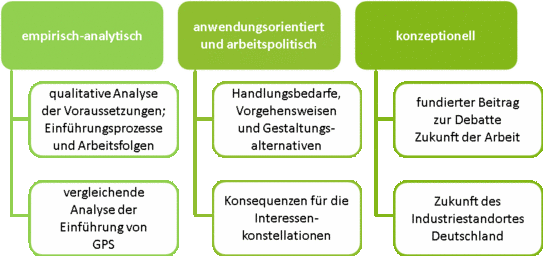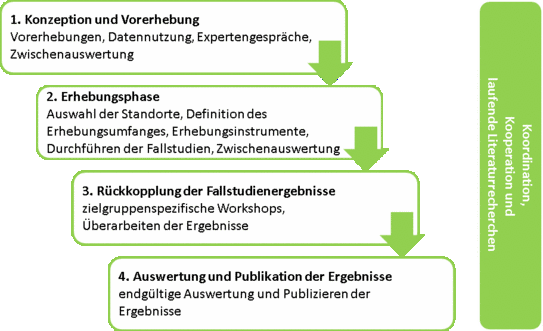New Forms of Industrial Work
(Project duration: May 2012 to March 2014)
Background
The assumption of the project is that Germany as a production location can only be secured in the long term through a high level of innovative ability on the part of the companies. Innovations include products, processes, organisation and marketing (service). Innovative processes are of central importance here, as they are the indispensable prerequisite for the production of technologically advanced products.
Process innovations have technological, organisational and personnel dimensions that are inseparably linked. This is the aim of the concept of Holistic Production Systems (HPS). With the introduction of HPS, processes are to be systematically and comprehensively standardised and made more flexible.
The project assumes that the introduction of HPS will give a new impetus to operational reorganisation processes. From a social science perspective, it is probably not exaggerated to speak of a new rationalisation paradigm. So far, however, there are only very few and hardly any systematic social and labour science studies on the preconditions, introduction processes and consequences of the introduction of HPS.
Objective
The project has three objectives (see figure)

This is linked to the three fundamental research questions of the project:
- What are the preconditions, concepts, forms of development and problem areas of the introduction processes of HPS?
- What consequences does the introduction of HPS have for organisational and work structures as well as the design of work systems at different levels?
- What labour policy consequences and unplanned consequences are associated with the introduction of HPS?
Project Design and -Phases
The empirical basis of the project are in-depth case study analyses in selected production sites of different companies.
This methodological instrument is intended to enable an in-depth qualitative analysis of the introduction of HPS and thus allow sufficiently substantiated statements about impact mechanisms and consequences. The case studies include guided interviews with management, supervisors, employees and the works council.

Research- and Development Partner
Due to its broad scope, the project will be carried out by the chairs of Economic and Industrial Sociology (Prof. Dr. Hartmut Hirsch-Kreinsen) and Work and Production Systems (Prof. Dr.-Ing. Jochen Deuse) at the TU Dortmund University. The Chair of Economic and Industrial Sociology is in charge of the project.
Funding Reference
This project (No. S-2012-543-1) is funded by:
Hans Böckler Foundation - Facts for a Fair Working World


![[Translate to English:] [Translate to English:]](/storages/zentraler_bilderpool/_processed_/2/6/csm_Altes_Maschinenbau-Gebaeude_3a1a87015a.jpg)